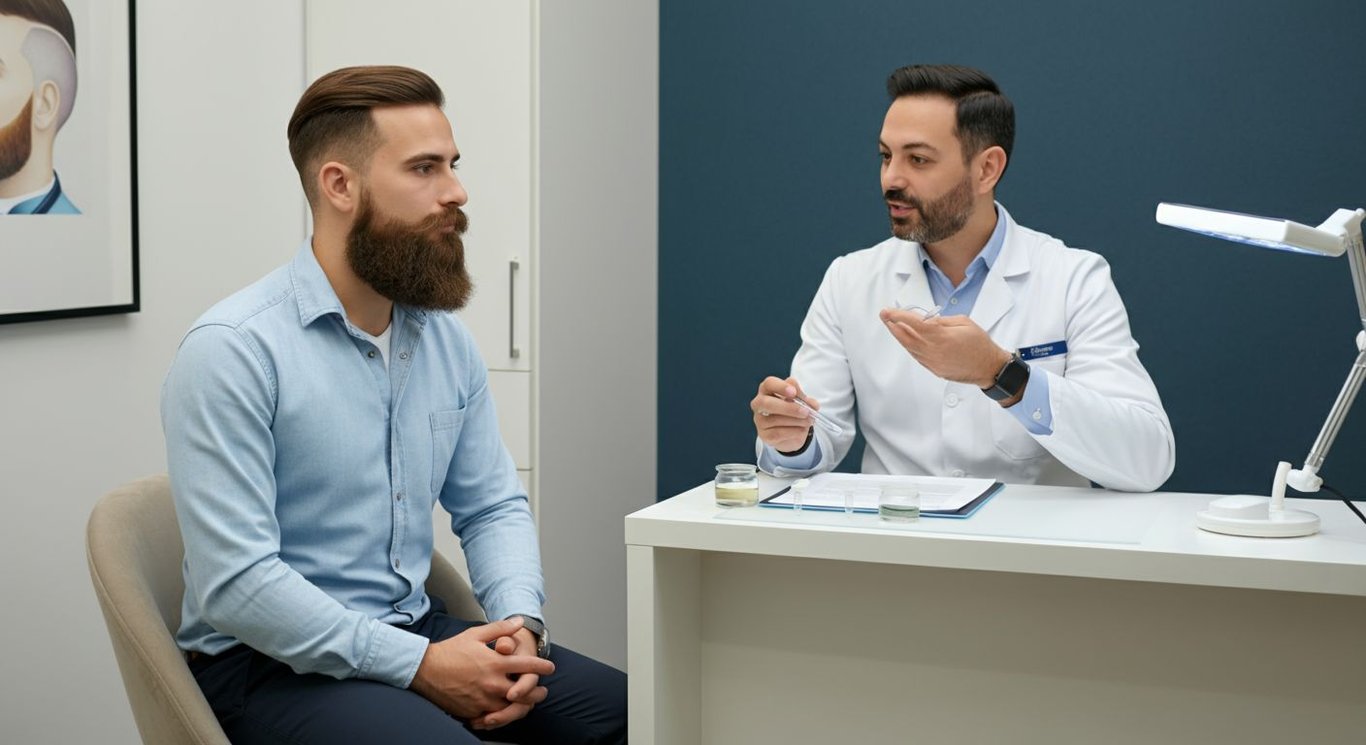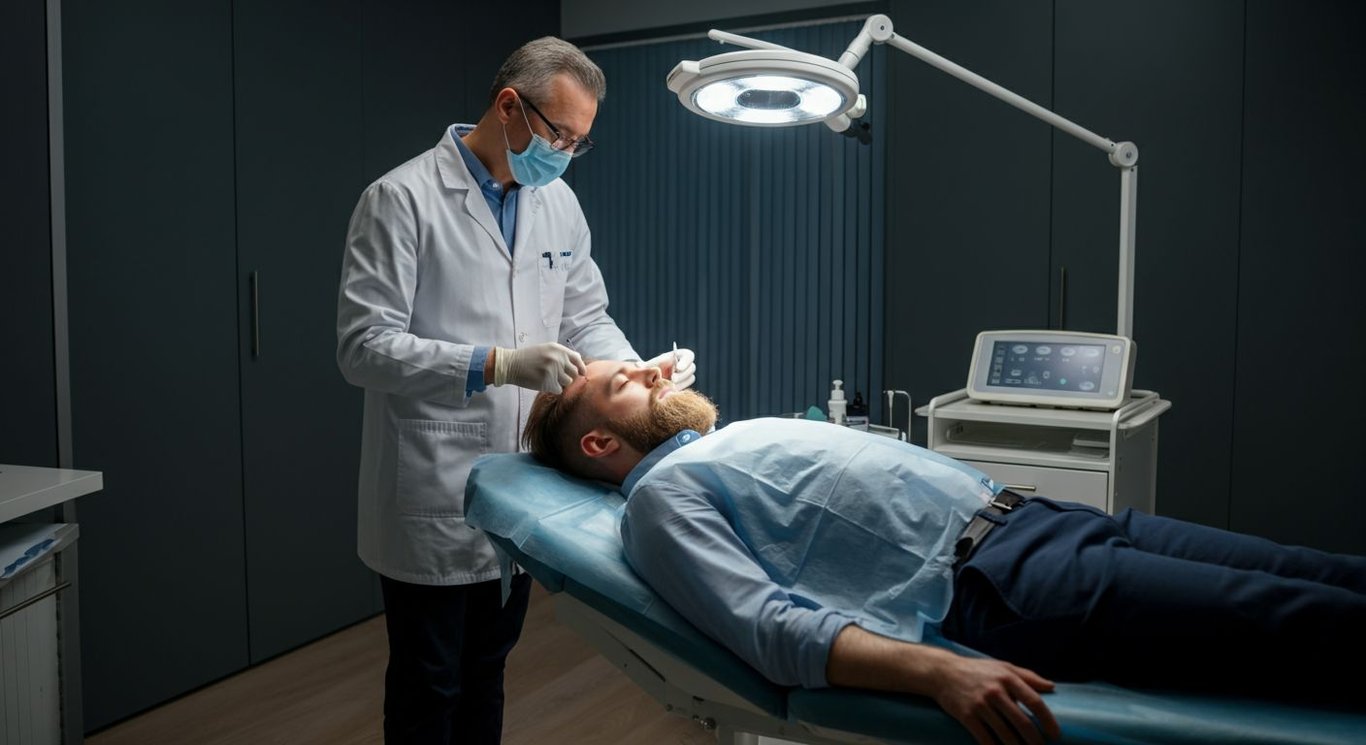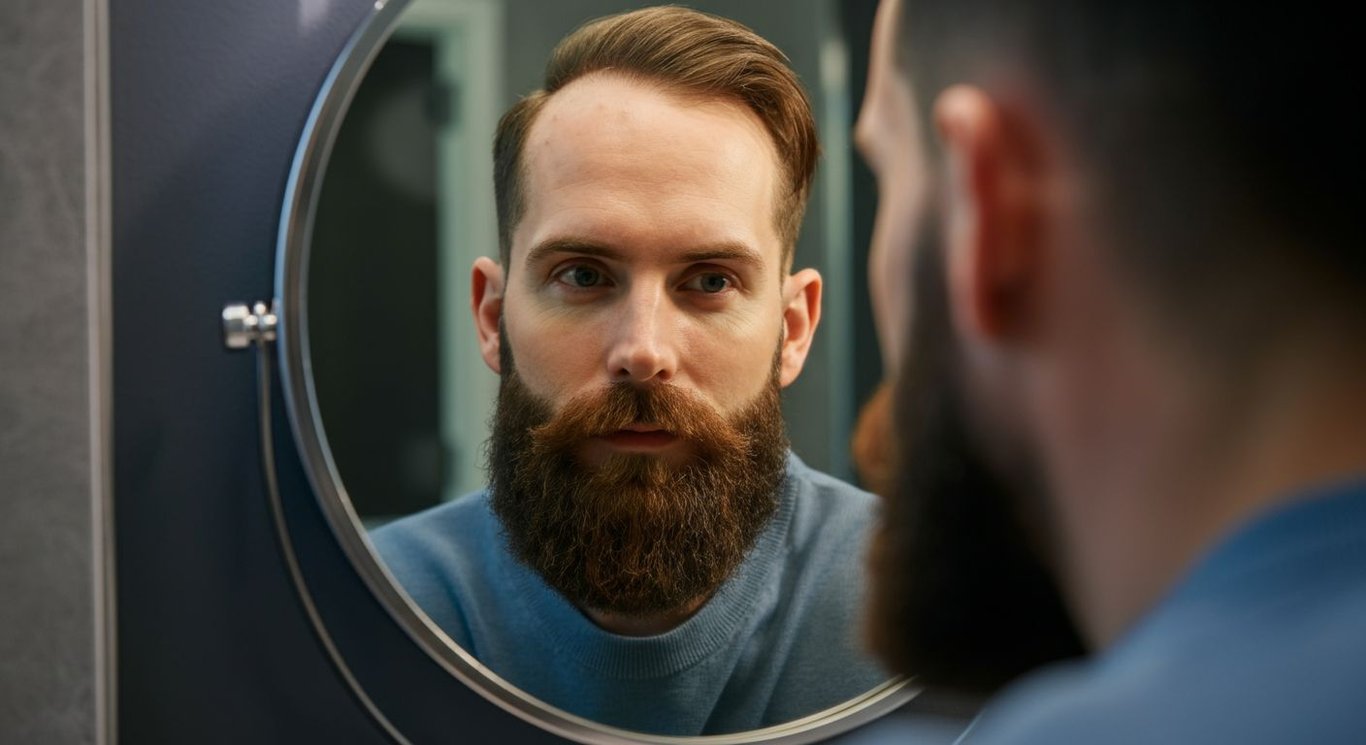Unlocking Your Dream Beard: A Guide to Beard Transplants
Explore the ultimate guide to beard transplantation—the easiest way to your dream beard.
If you’ve ever dreamt of having a fuller, thicker beard, then a beard transplant might be the answer to your prayers. In this comprehensive guide, we’ll walk you through everything you need to know about beard transplants, from basic procedures to the latest FUE techniques. With expert insights and guidance from estethica, a leader in medical aesthetics, achieving your dream beard has never been easier.
Beard Growth Surgery: Is It Right for You?
Determining Candidacy for Facial Hair Restoration
Beard transplants can be a transformative solution for those seeking to improve their facial hair density. Many individuals experience sparse or uneven beard growth due to a combination of genetic predispositions, hormonal imbalances, and specific lifestyle factors. A beard transplant offers a tailored approach, using advanced techniques to fill in these gaps.
Ideal candidates often include those who have struggled with achieving their desired beard style, regardless of the underlying cause. The follicular unit extraction (FUE) method is frequently employed in facial hair restoration, offering advantages such as reduced scarring and a more natural-looking outcome. This technique involves extracting individual hair follicles from a donor area, usually the back of the scalp, and transplanting them to the beard area.
Key Benefits of Beard Growth Surgery
- Enhanced Facial Aesthetics: Achieving a fuller, well-defined beard can significantly improve facial symmetry and overall appearance. The precision of facial hair implants allows for customizable density.
- Minimally Invasive Procedure: FUE beard transplant is less invasive than traditional surgical methods, resulting in minimal discomfort and a quick return to daily activities. This ensures a smoother recovery with less downtime.
- Permanent Results: Once the transplanted hair follicles adapt to their new location, they continue to grow naturally, providing a long-lasting aesthetic enhancement. This offers a permanent solution to sparse beard growth.
Understanding the Beard Transplant Process
- Initial Consultation: A detailed evaluation by a specialist helps determine the feasibility and expected outcomes of the transplant. This includes assessing donor hair availability and discussing desired beard styles.
- Follicle Extraction: Using the FUE technique, individual hair follicles are carefully extracted from the donor area, ensuring minimal scarring. The extraction process is meticulously planned to maintain the natural appearance of the donor area.
- Implantation: The extracted follicles are then precisely implanted into the recipient area, following the natural growth pattern of facial hair. This step requires artistic skill to ensure a realistic and aesthetically pleasing result.

Facial Hair Restoration: Achieving Natural-Looking Results
Customizing Your Beard Design with Expert Precision
Facial hair restoration involves more than just adding hair; it's about creating a beard that complements your individual facial structure. At estethica, the focus is on ensuring that each transplanted hair is positioned at the optimal angle, aligning with your natural hair growth patterns. This meticulous approach guarantees results that appear entirely natural. The precision used in facial hair implants helps to ensure that the new beard blends perfectly with existing hair.
Patients can anticipate an in-depth consultation process where beard style preferences are thoroughly discussed, and realistic expectations are set. This includes analyzing facial contours and recommending beard shapes that enhance overall features. Post-procedure, regular follow-up appointments are essential to monitor the progress of hair growth and ensure the transplanted hair remains healthy and robust.
Essential Post-Operative Care for Beard Transplants
- Gentle Cleansing: Regularly wash the transplanted area with a mild, non-irritating cleanser to prevent infection. This is important for maintaining a clean environment for the new hair follicles to thrive.
- Avoid Direct Sunlight: Protect the treated area from direct sun exposure to prevent damage to the newly implanted follicles. Use a hat or sunscreen designed for sensitive skin.
- Hydration and Nutrition: Maintain a balanced diet and stay well-hydrated to promote optimal hair growth and overall health. Proper nutrition supplies the necessary nutrients for hair follicle development.
Factors Influencing the Success of Facial Hair Restoration
- Quality of Donor Hair: The density and health of the donor hair significantly impact the final outcome of the transplant. Strong, healthy follicles are more likely to thrive in the recipient area.
- Surgical Precision: The skill and technique of the surgeon in placing the hair follicles determine the naturalness of the result. Precision is key to achieving the desired aesthetic.
- Patient Compliance: Adhering to post-operative care instructions is crucial for ensuring the survival and growth of the transplanted hair. Following the recommended care regimen is essential for optimal results.

FUE Beard Transplant: Revolutionizing Facial Hair Implants
The Distinct Advantages of FUE for Facial Hair Implants
The Follicular Unit Extraction (FUE) technique represents a significant advancement in the field of beard transplant procedures, offering a range of benefits over traditional methods. Unlike older techniques that involve removing a strip of skin from the donor area, FUE allows for the extraction of individual hair follicles. This minimizes scarring and provides a more natural-looking result, which is especially important for beard restoration where aesthetics are paramount. The technique's precision makes it an excellent option for those seeking subtle yet effective beard density improvement.
For individuals seeking facial hair restoration, the FUE method offers a less invasive option with reduced discomfort during the recovery period. This technique is particularly suited for those who desire to wear their hair short, as it avoids the linear scar associated with strip excision methods. FUE's minimally invasive nature results in faster healing times, allowing patients to return to their normal routines sooner.
Key Advantages of Opting for FUE Beard Transplant
- No Linear Scarring: FUE leaves tiny, virtually invisible dot-like scars, making it ideal for those who prefer shorter hairstyles. The absence of a long scar ensures greater flexibility in hairstyle choices.
- Reduced Post-Operative Discomfort: Patients typically experience less pain and discomfort during the recovery period compared to traditional methods. The minimally invasive nature of FUE contributes to a smoother and more comfortable healing process.
- Faster Healing Time: The recovery period is generally shorter with FUE, allowing individuals to resume normal activities more quickly. This quick turnaround is a significant advantage for those with busy lifestyles.
The FUE Extraction Process Explained
- Follicle Isolation: Individual hair follicles are carefully selected and isolated from the donor area, typically the back of the scalp, using specialized micro-punches. This selection ensures that the healthiest and most viable follicles are chosen.
- Gentle Extraction: The isolated follicles are then extracted with precision, minimizing trauma to both the follicles and the surrounding tissue. The gentle extraction process is crucial to maintaining the integrity of the follicles.
- Careful Implantation: The extracted follicles are meticulously implanted into the recipient area on the face, following the natural growth pattern and angle of existing facial hair. Precise implantation ensures a seamless and natural-looking result.

Beard Density Improvement: What to Expect After Your Transplant
Anticipating Growth and Density After Your Beard Transplant
After undergoing a beard transplant, patients commonly seek details about density improvements and growth timelines. Typically, significant results become visible between 6 to 12 months post-procedure. An initial phase of shedding, often called "shock loss," is a normal and temporary part of the process. Ensuring adherence to estethica's comprehensive post-operative care guidelines, including the application of specialized creams, is crucial.
Following these instructions and protecting the treated area from direct sunlight can substantially influence the success of the transplant and enhance beard density. The transplanted hair follicles require a nurturing environment to establish themselves and begin to thrive. Proper care not only supports their survival but also optimizes their growth potential, resulting in a fuller, more robust beard.
Maximizing Beard Density Through Post-Op Care
- Adhere to the Recommended Skincare Routine: Utilize the special creams and solutions provided by estethica to nourish the transplanted follicles and promote healthy growth. These products are specifically designed to support healing.
- Shield Against Sun Exposure: Protect your face from direct sunlight to prevent damage to the sensitive, newly transplanted hair follicles. Prolonged exposure can hinder the healing process and affect hair growth.
- Maintain a Healthy Lifestyle: Ensure you are eating a balanced diet and staying hydrated to support optimal hair growth. A healthy body provides the necessary nutrients for hair follicle development and overall transplant success.
Understanding the Stages of Beard Growth After Transplant
- Initial Shedding Phase: Expect to see some of the transplanted hairs fall out within the first few weeks. This "shock loss" is a temporary condition as new hair begins to grow from the transplanted follicles.
- Early Growth Phase: New hair growth will become noticeable a few months after the transplant. These hairs will initially be fine and delicate.
- Full Density Development: Over the following months, the transplanted hair will thicken and mature, resulting in increased density and a fuller beard. Patience is key as the beard continues to evolve.
Precision FUE Technique: Revolutionizing Natural Beard Restoration
Comprehensive Post-Transplant Support for Optimal Beard Density
Frequently Asked Questions
What is a beard transplant, and who is an ideal candidate for facial hair restoration?
How does the FUE technique revolutionize facial hair implants compared to traditional methods?
What can I expect in terms of beard density improvement after a beard transplant, and how can I maximize results?
What essential post-operative care steps are crucial for ensuring the success of facial hair restoration?
What factors influence the success of facial hair restoration procedures?
Discover your path to healthy beauty with estethica's expert guidance.
📞 Call Now for a Free Consultation!